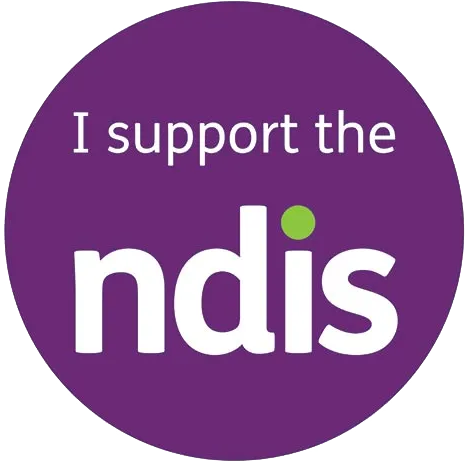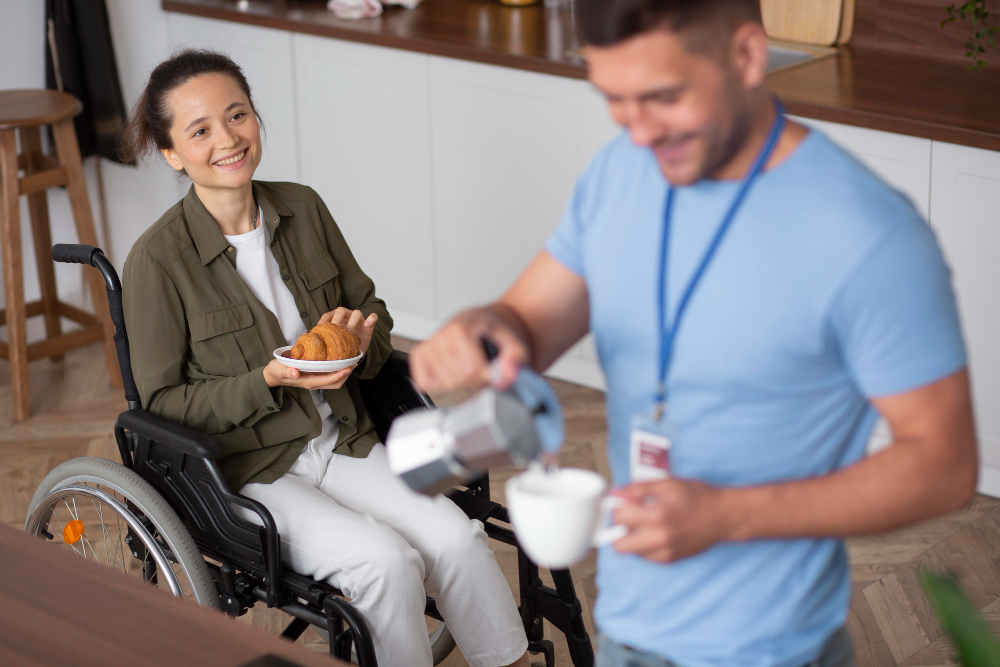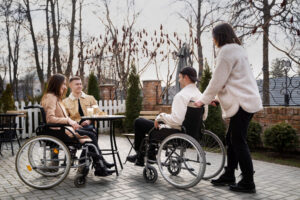Understanding the National Disability Insurance Scheme (NDIS) can be tricky, especially when figuring out what kind of support is available. Assistance with Daily Life is an important type of NDIS support that can improve your independence and make everyday tasks easier.
In this blog, we’ll go over what Assistance with Daily Life is, who qualifies, and how to check if it’s included in your NDIS plan. Let’s get started on how this assistance can truly transform your life!
Read on to learn how Assistance with Daily Life can benefit you!
What is NDIS Assistance with Daily Life
Assistance with Daily Living is a funding sub-category under Core Supports on the NDIS. The goal of this NDIS budget is to provide the assistance you require in your daily personal activities so that you can live as independently as possible in your home and community.
Because each person living with a disability has unique needs, the type of daily support participants receive will differ from one another. NDIS Assistance with Daily Life is thus tailored to you and your specific needs. This way, everyone gets the assistance they need to live a more self-sufficient life.
Support types that you may be able to access under Assistance with Daily Life in your NDIS Plan include:
- Assistance with daily personal activities
- Assistance with household tasks
- Assistance in shared living arrangements
- Supported Independent Living (SIL)
- Short Term Accommodation and Assistance (or respite).
- Support may be provided at home or in the community.
Examples of NDIS Assistance with Daily life
The National Disability Insurance Scheme (NDIS) provides various forms of support to help individuals with disabilities live more independently and participate in their communities. Assistance with daily life is one of the key support categories under the NDIS. Here are some examples of assistance with daily life:
- Personal Care: This includes assistance with personal hygiene, including bathing, dressing, grooming, and showering. It also covers assistance with toileting, including catheter care and managing incontinence, as well as support with eating and drinking to ensure proper nutrition and hydration.
- Assistance with Household Tasks: This involves Assistance with cleaning and household maintenance, also helps with laundry, including washing, drying, and ironing clothes. Meal preparation and cooking support is also provided to ensure balanced and healthy meals.
- Mobility and Transfers: Focuses on helping individuals move around the house or community, providing support with walking or using mobility aids. It also includes help with transfers, such as moving from a bed to a wheelchair or from a wheelchair to a car, to ensure safe and smooth transitions.
- Medication Management: Provide assistance with administering medication, including providing reminders to take medication on time. It also includes support with managing and organizing medication supplies to ensure the individual takes their medications correctly and consistently.
- Health and Well-being: Helping individuals attend medical appointments and therapy sessions. Additionally, it involves assistance with following health and fitness plans to promote overall well-being and maintain a healthy lifestyle.
- Community Participation: This encompasses support with accessing community services and activities, ensuring individuals can engage and participate in their community. It also includes assistance with attending social events, recreational activities, and volunteering to promote social interaction and community involvement.
- Transport: Assistance with transport involves helping individuals get to appointments, work, or community activities. It also includes support for learning to use public transport independently, enhancing their ability to navigate their environment and maintain their independence.
- Skill Development: Focuses on supporting the development of daily living skills, such as budgeting, shopping, and cooking, to promote independence and self-sufficiency. It also includes assistance with learning to use technology for communication and daily tasks, enabling individuals to stay connected and efficiently manage their day-to-day activities.
These services are made to the needs and objectives of the individual, offering the help required to improve their independence and standard of living.
What’s not covered under NDIS Assistance with daily life
The NDIS offers a variety of support to help those who have disabilities live their lives more independently. However there are certain things that aren’t covered under the “Assistance with Daily Life” category. Here are a few examples of what’s not covered by the NDIS:
- General Household Costs:
- Rent or mortgage payments.
- Costs for utilities (electricity, gas, water).
- Food and grocery expenses.
- Health and Medical Services:
- General medical treatment and procedures that are covered through Medicare and private health insurance.
- Dental services.
- Hospital charges.
- Leisure and Entertainment Costs:
- Tickets for movies, concerts, shows, or sporting occasions.
- Membership fees for gyms or clubs (unless explicitly required in the health or therapy plan).
- Things for general use
- Furniture and white goods (unless directly connected to the disability of a participant).
- General clothing and footwear.
- Purchase and maintenance expenses (though modifications that are related to disability could not be eligible for coverage).
- Personal expenses:
- Personal loans or debts.
- Legal fees (unless directly connected with the disability of the participant).
- Penalties and fines.
- Supports that duplicate other systems:
- Education supports that schools must offer.
- Employment support services are offered through the mainstream services.
- Supports that must be offered by the elderly care system for people who are over 65.
- Costs not related to disability:
- Support or service that isn’t directly related to the disability of a person.
- General maintenance of family or personal vehicles (unless connected to modifications for disabled persons).
- Costs of Travel and Vacation:
- Travel expenses not tied to disability-related needs.
- Holiday costs (though some assistance for travel may be provided).
The NDIS is designed to cover reasonable and necessary support services which are directly connected to the participant’s disability. Thus, support that falls outside this definition or are considered to be general living expenses, are generally not covered.
Will Assistance with Daily Life funding be covered by my NDIS plan?
Assistance with Daily Life funding can be included in your NDIS plan if thought to be reasonable and appropriate to meet your needs. This support is provided to assist with daily tasks like personal care, household chores, moving around, and developing skills. To be eligible, your disability has to significantly affect your ability to complete these things independently. During your NDIS meeting for planning, you must make clear your needs and present proof from your healthcare professional. If this funding is approved, it will allow you to access services that can improve your living quality.
To determine if assistance for Daily Life funding is included in your NDIS plan, you can follow these steps:
- Review Your Plan
- Check the Core Supports Budget
- Understand the Plan Details
- Contact Your NDIS Planner or Local Area Coordinator (LAC)
- Use the MyPlace Portal
- Seek Support Coordination
If you follow these steps, you will be able to determine if the Assistance for Daily Life funding is included in your NDIS plan and then get the support you need to improve your independence and the quality of life.
Eligibility for NDIS assistance with daily life
There are two main parts to consider for NDIS assistance with daily life. Firstly NDIS eligibility in general. Next is Funding for assistance with daily life.
Even if you meet the general eligibility for NDIS, getting assistance with daily living activities is assessed on a case-by-case basis. The NDIS will consider if the support is “reasonable and necessary” for you to achieve your goals.
Conclusion
In conclusion, NDIS Assistance with Daily Life under the National Disability Insurance Scheme is an integral component of making everyday tasks manageable and attaining higher quality of life. From personal care assistance, household tasks or community participation; Assistance with Daily Life funding can make an immense impactful difference on independence and well-being. Understanding what’s covered under it as well as accessing it are key components in making optimal use of NDIS funding.
Ready to take the next step? If you believe Assistance with Daily Life supports could benefit, review your NDIS plan today, reach out to your NDIS Planner/Local area coordinator and ensure you are getting most out of your plan.
For more information and additional support, contact or schedule a consultation with your NDIS planner now to receive personalized help for all of your NDIS needs and start living your best life today! Don’t Wait–Give yourself the resources necessary and live out the life that matters the most to YOU today.
Get in touch with us to explore your options and maximize your NDIS plan!
Disclaimer: This blog provides general information about NDIS Assistance with Daily Life. Visit the NDIS website or get in touch with your NDIS planner to make sure you get the most recent information possible regarding eligibility, financing, and particular services.










